#104! at least not 103
Explore tagged Tumblr posts
Text
anyway i have reached my daily limit of stomach cancer(/hj) jokes i can make to my friends today (1) so I'm gonna complain here instead that i have the worst abdominal pain I've had in weeks and i feel so sick
#i had one week of being able to eat as normal!#i was hoping it would stay but I'm afraid I'm back on the hills again where i gain a little and drop all of it and more#i just want to be able to have my appetite at least when i go out to eat w my friend it's a shop I've wanted to try for a while#I'm so excited for it actually ahhh i also have been wanting to go to those stores I'm so excited i ordered my beads already#i get to dress nice and have fun and i'm thinking of baking them something tmr or bring a little jar of jam I've made before i left#and i can show them the stuff I've been working on!!! yippeee#4 hour yap fest here i come#oh boy yeah i thought i would gain weight from eating normally for a week but i actually. dropped again. dang.#104! at least not 103
0 notes
Text
For the Sake of Appearances
It's obvious that Eden Academy is a superficial place, despite the efforts of Henderson and other teachers to uphold its educational mission. Like any elite institution, most of its students hail from rich families and don't actually need a degree from Eden to be more than comfortable in life. Most of them are there acting as proxies for their parents, to accumulate even more wealth and power, often by schmoozing with people higher up on the chain like the Desmonds.
Twilight of course is aware of the dynamics and rules of the game at Eden and is playing to win. He crafts an upper middle class cover that will fit in decently without being rich or powerful himself. He looks for a smart child. He looks for a wife. Because apparently only children with two parents can get into the school.

Throughout the whole story so far he has been concerned about his family's image, both so his cover won't be blown, and so that Anya will advance Plan A or Plan B. He is sensitive to Anya acting out of turn, like punching Damian, or falling behind academically and having no talents with which to gain extracurricular Stellas.
Back when the Imperial Scholars Mixer chapters came out (before I joined the fandom), I'm sure there was a lot of discussion about the moment Anya made her speech to Damian and said this:

The sadness around Anya not knowing whether her adoptive father even likes her dominates this chapter, at least for me. But on a second read I thought about Twilight's perspective here.
For someone who has been so worried about appearances -- making sure his family can at least pretend at cultured tastes and manners, somehow pushing Anya to get good grades or preventing her from failing (by breaking into the records room), and ensuring his own image is immaculate -- one might expect that Twilight would also worry about appearances here. His daughter just admitted to his chief target's son that she doesn't know if her father loves her. Is that not breaking the facade of a loving nuclear family, which he needed to project at the Eden admissions interview?
But, sadly, having a loving family isn't actually a requirement among the many appearances people have to keep up in the Eden crowd. Damian himself is exhibit A on that front. Both his parents hardly ever bother to visit him or talk to him, and as we see in Chapter 104, it's made him avoid going home except when none of his family members are there. From a utilitarian perspective, it may be good that Anya said this to Damian, so she could appear empathetic to his situation.
What is really interesting is that we don't get any of Twilight's inner thoughts about Anya's speech, probably because he's so focused on Donovan's arrival. All we see is an "Anya..." which could be Endo hiding any further insights on Twilight from the audience, or Twilight genuinely not knowing what to think, or Twilight turning off his over-analyzing tendencies for once and even forgetting to worry about appearances, because his daughter really got to him with that speech. If the latter is true, it might explain his behavior during the cruise arc where he tries so hard to please Anya, with the whole "I'm a normal father. A good father," piece. Bit by bit, he starts to care about more than just appearances or outcomes, and shows through his actions that he wants Anya to be happy. He doesn't tell himself that her happiness is for the cover or for the mission as often as before.
I really do hope that in some future chapter we get a callback to this scene in Chapter 37 where Anya was uncertain whether her father likes her. After 103, where we even got a brief flashback to their first day out as a family overlooking the shopping street, I feel a bit more hope that at some point Twilight will give Anya the reassurance she needs directly or indirectly.
Or maybe, Anya has already figured it out, from all the things he's done for her and how his behavior has changed gradually since that day in the courtyard.
#spy x family#loid forger#anya forger#spy x family manga#spy x family analysis#agent twilight#damian desmond
114 notes
·
View notes
Note
Do you know why no one’s attempted to bond with Vermithor until now? At least in show verse. Daemon’s ego at least seems like he would have wanted him. And the way the show’s apparently bent the lore enough to where Rhaenyra can touch him unscathed..seems like Vermithor actually inexplicably liked her lol to the point where it seems had she attempted to bond with him in her youth she may have been successful.
In show-verse, we're told that Daemon wanted Meleys (his late mother's dragon), and after Meleys rejected him and accepted Rhaenys instead, he bonded with Caraxes (Rhaenys's late father's dragon). I'm not sure exactly when all this was going on in HOTD time, but in book-verse Rhaenys was 13 and Daemon was 6 when she claimed Meleys in 87 AC (three years after Alyssa had died), and Daemon didn't claim Caraxes until he was at least 11, after Aemon died in 92 AC. But either way it doesn't matter, Jaehaerys died in 103 AC, so Vermithor wasn't freed up until then.
Now, Book!Rhaenyra first rode Syrax in 104 AC, when she was 7. Show!Rhaenyra has the same birth year, and show!Jaehaerys's death year is also the same. So Vermithor was available at the time Rhaenyra first rode Syrax (assuming that show!Rhaenya also became a dragonrider at age 7). However, it is frequently assumed that Syrax was a cradle egg (though the book says nothing one way or the other, and neither has the show). In the book Syrax is called "young" when Rhaenyra first flew her; HOTD's 1st episode script, when Rhaenyra is 14, calls Syrax "adolescent". It's quite possible Rhaenyra had no interest in Vermithor because she had her birth-bonded dragon to ride once she was big enough.
Alternatively, it's possible that the Dragonkeepers warned 7-year-old Rhaenyra away from the notably grouchy and angry Vermithor and towards a younger dragon more suitable for her age, as they did when Alyssa initially wanted to claim Balerion. In general I'd suspect that would be the case for most young dragonriders, at least the ones who weren't already bonded to cradle-egg dragons. (As Rhaenyra's sons were; it's unclear whether Sunfyre and Tessarion were cradle eggs, or bonded while very young.) And we know it was suggested that Aemond pick out a dragon egg or hatchling, before he claimed Vhagar by himself.
So yeah, I figure the Dragonkeepers would very much prefer not to see a repeat of the deeply unfortunate Aerea incident, where it was Balerion in control, taking the 12-year-old girl to his definition of home, not hers. Let alone allowing a young prince or princess to get flamed to ash on their watch. When someone young does go for a massive old dragon (Laena or Aemond with Vhagar), it seems most likely it's done where the busybody protective Dragonkeepers can't interfere... which was not Rhaenyra's situation in King's Landing.
I hope that helps!
#house of the dragon#hotd meta#asoiaf#asoiaf meta#vermithor#rhaenyra targaryen#daemon targaryen#rhaenys targaryen the queen who never was#meleys#caraxes#alyssa targaryen#aemon targaryen son of jaehaerys#jaehaerys i targaryen#syrax#balerion the black dread#aerea targaryen#dragons#dragonriders#dragonkeepers#anonymous asks#btw vermithor probably grew much larger than older dreamfyre because she was kept in the dragonpit while he had the freedom of dragonstone#why he got so much bigger than silverwing though idk. sexism probably lol#also fyi: if anyone replies to or reblogs this post with spoilers from the leaked season finale i will block you straight up
110 notes
·
View notes
Note
PREDICTIONS AHEAD! I noticed how the second arc enders were all closer to each other and after analyzing a bit, I then came to the conclusion that the odd enders are more spaced apart than the even enders. 1st arc enders Resonating with you - E21 Magical Showtime - E 25 What Lies Behind - E 38 MORE MORE CHRISTMAS - E 42 Power of Unity - E 54 [Amplitude of 33] 2nd arc enders STEP BY STEP - E 98 Farewell My Mask - E 100 Our Constelatoin of Song - E 101 On Your Feet - E 103 Our Happy Ending - E 104 [Amplitude of 6] 3rd arc enders Over Rad Squad - E 135 Our Hands, Covered in wounds - E 150 [Amplitude of 15 so far]
I would then risk to say that the next arc ender could be Wonderlands Showtime, with a Rui event. We can see from the 1st arc ender that the space between events varies between little jumps and big jumps. We had a big jump now [150-135 = 15] similar to the leap between the WxS and N25; and MMJ and Vbs arc enders. Considering we just got Nene5, 5/6 events from now we should get Rui5, like how we got mizuki5/ena5 with 5 events of interval. It cannot be mmj since Shizuku5 is right at the door. And meanwhile, Rui4 gets closer to EN Server.

For future predictions, I would risk either Haruka 5 or Shiho 5, both as arc enders of their respective units. But considering how Shiho had an event just now, along with being a 2* on both Ichika's and Saki's events, I'm leaning toward her side. (but I would like to mention how Hona5 as ard ender is also a possibility) Shizuku was also featured at said event, although 2 events later she's ready to go.
As for closer events I would like to recall that Honami is dangerously close to focus jail so having her somewhat soon could help fill events.
I would also like to mention our boy Toya who is also getting close to jail. He has gotten many events and cards, his ocean orchestra and 4th anni limited leave me somewhat confused but, considering An5, Kohane5 were limited. Along with Toya getting featured on the 4th anni makes me think he is a permanent event. As for the New Year's. We have 13 Contestants: Ichika; Saki; Minori; Airi; Shizuku; Akito; Toya; Emu; Nene; Rui; Kanade; Mafuyu; KAITO We take out Ichika and Saki immediately for they have gotten hairstyles just a month ago. Followed by Shizuku who is getting her event just now. That leaves us with Mafuyu, Emu, and KAITO as the ones with the least hairstyles, whose dynamics match. Throw in Ichika, whose last 2* was the Sanrio collab, and who knows Mafuyu, their last event dates back to February with Relax Tea Time. Finally, Nene had her last 3* in the 2.5 anniversary. Not to mention that with Ichika and Emu, the dynamic is assured. For Bloom, we can start by looking at Len, the VS with less hairstyles. If we assume that clpl will follow any pattern, we cannot link him with An or Toya since he is a starter VS of VBS. Looking back, neither Shiho, Airi, nor Toya can be, since they got hairstyles from the 4th Anni leaving us with Haruka, who got her Colorfes a long time ago. Similar to Kanade and Rui. If we instead go from the OC with fewer hairstyles, we get Toya. He cannot be linked with Len, and Miku has gotten her hairstyle sooner than Luka. Miku got in ORS while Luka in Wedding Live
This is probs all wrong, it's 5:30am now, have a good day!
aaaa i'm so sorry i'm so late to answering this, i've been meaning to for like two weeks i just kept forgetting orz
okay so for arc enders i definitely think the remaining three will be the next 1 or 2 events for each unit. if we assume 6th anniversary to be arc ender 4/graduation we don't want some units to be speedrunning their conclusion again, which would likely happen if we don't finish up very soon. (how wxs managed to be rushing arc 2 in the first place is a mystery but what's done is done. this is mainly about vbs taking 1yr 8 months to finish arc 1).
my guess is that the next mmj and ln events are arc enders. it'd make sense given the way their recent stories have played out. wxs i'm less sure about. i'm fairly certain next event will be emu and not rui, due to some stuff that happened in emu's card story. given that every troupe we've visited so far has had two dedicated events, we can assume next event will still be the opera company, so it depends on if they want that to be the arc ender or have a conclusion event/rui5 afterwards.
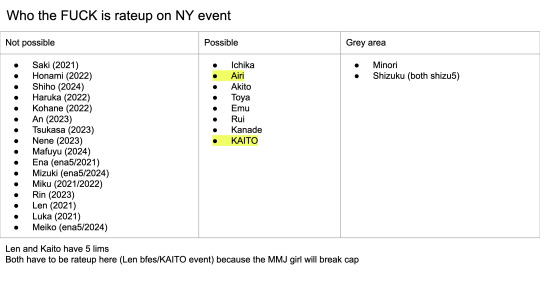
i don't think emu/mafuyu/kaito + nene/ichika NY is very likely at all. emu and mafuyu had a mixed event focused on them only a few months ago, and kaito would have to be an MMJ lim (we literally just got N25 Meiko last month) meaning we need an MMJ girl on the banner, who is most likely to be Airi, though Minori is not impossible. Mafuyu and Nene both already have trained NY cards as well, so they're off the table entirely. Ichika being 2* wouldn't actually be surprising to me though. I think Kanade or Akito is likely to fill the last 4* slot.
bfes has to be Len or he will end up really far behind everyone else bc the mmj girl will break lim cap. also he's really due one anyway so i agree w you there. the pairing character has to be from ln, mmj, or vbs. from those units, the character with the current oldest lim is An, who also doesn't have 7 lims yet either. she's my pick since then you don't have to give her another lim until her 5th anni banner card either. however, she's also possible for vday or wday if we go by the theory that the vsinger cant match with a starter unit member.
i don't think haruka is a likely pick, since that would make 3 out of the 5 rateup characters total be mmj unit (kaito/haruka/either minori or airi), something that only 1 fes gacha has done before (rise as one + fes, but that was an exception anyway due to the need to include saki on wxs fes). if i had to go with anyone other than An, I'd pick ichika or akito or toya.
22 notes
·
View notes
Text
Comprehensive Trigun Stampede Timeline
(With sources and references!) I will use the abbreviations EY to stand for Earth Year and PE to stand for Planet Era, the calendar and year system used by No Man's Land. I will use ~ in front of a date to indicate that it's not concrete but is about that time.
This should hopefully be a comprehensive timeline for TriStamp. I've done my best to comb through both the series as well as some of the extras from Studio Orange on Twitter, and I will provide sources/pictures as well as reasoning where relevant. So onto the actual timeline starting with.....
~EY 2256 - Project SEEDS leaves earth - based on Rem saying that it has been about 200 years since they left Earth and in that scenes the boys look like they do after at least a year old.
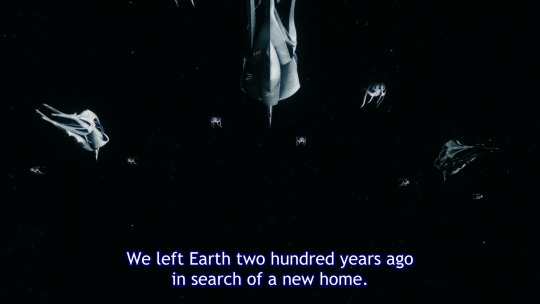
EY 2405 May 3rd - Tesla is born

EY 2455 July 21st - Vash and Nai are born
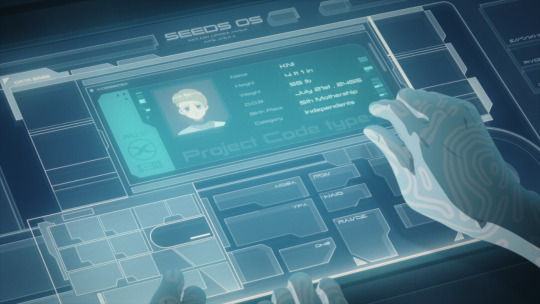
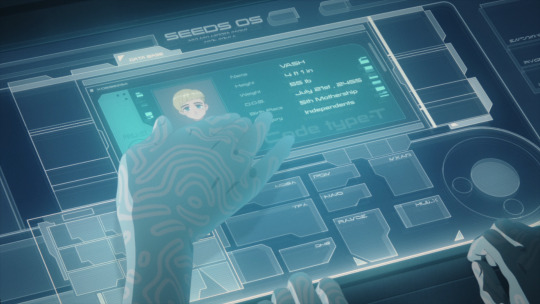
EY 2456 July 21st - Vash and Nai's first birthday
~ EY 2456 - The Big Fall - due to the fact that Vash and Nai still look about the same age it is either the same year or pretty close to it when the Big Fall happens
~ EY 2461 - When Vash runs away from Home to confront Nai and he gets his arm cut off. Brad says it had been 5 years since the Big Fall.
PE 00 November 1st (~ EY 2502) - The first city November is established as well as the Planet Era Calendar. Based on Vash, Nai, Luida, and Brad all saying it has been about 150 years since the Fall at the time the actual episodes take place, the math works out to this happening about 46 years after the big fall. This information comes from Studio Orange's twitter where they posted some extra world building info.

PE 00 December (~ EY 2502) - 2nd city December is established
PE 01 July (~ EY 2503) - 3rd city July is established (RIP your theme song slapped)
PE 01-02 (~ EY 2503-2504) - The rest of the seven cities of Augusta, Octovern, May, and September are established
~ PE 79 (~ EY 2581) - Rollo is taken and Eye of Michael-ed. Based on a combination of what Roberto and Conrad say in episode 5. Conrad says in the flash back after Rollo has been experimented on that he is the first to survive for 5 whole years. And then Roberto later says its been about 20 years since the town was abandoned aka since Rollo came back as Monev the Gale and wrecked the place. Roberto says the 20 years comment when looking at the state of the house and before finding the photo of Vash and bby Rollo.
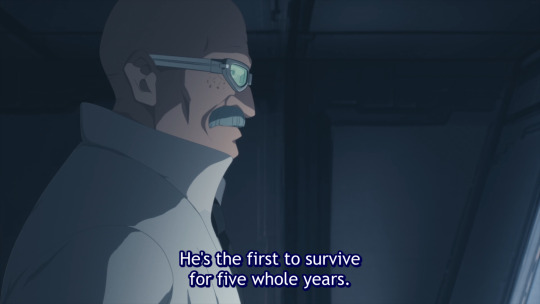
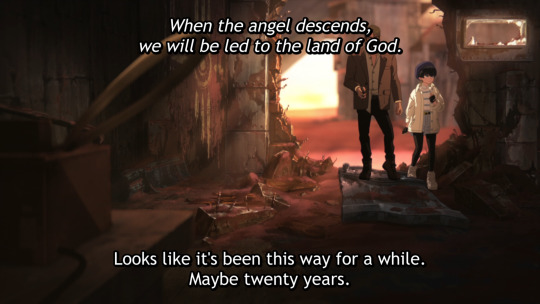
PE 81 (~ EY 2583) - Meryl is born! This also helps us establish the year the episodes take place as Meryl was born in 81, is 23 years old, and just finished college in 103 which you can just make out at the bottom of the screen. (23 + 81 = 104) Meaning the majority of the episodes themselves take place in PE 104

~ PE 84 (~ EY 2586) - Rollo comes back to the windmill town as Monev the Gale and wrecks the place.
PE 99 - PE 103 (~ EY 2601 – 2605) - Meryl is in college!
PE 104 May 25th (~ EY 2606) - We finally get to Episode 1! Meryl and Roberto find Vash half dead and he has the duel with the military police! As stated earlier we have determined the year based on Meryl's resume.
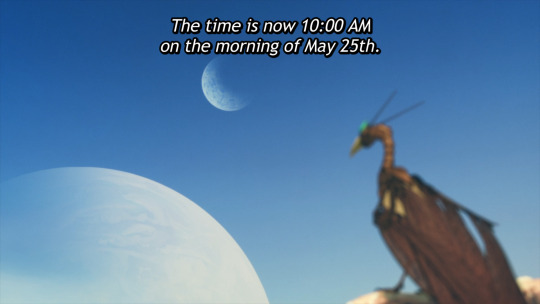
PE 104 May 25th/26th - Episode 2/3 happens. This episode may either be the same day as episode 1 or it could be the next day as there is multiple ways to determine the timing. First way: As Vash is attempting to leave Roberto does say "Wait... You told me this morning." when asking who Vash is seemingly running away from. This would indicate that it is the same day as episode 1 since that is when Vash first tells them about Knives. Second way: Episodes 2/3 take place the next day as in the intro sequence while Vash is cleaning his gun it is night outside as shown by the window in his room, and later on we see it is day and we know it is a window as when Vash is leaving you can see the light outside. I personally still think this is the case since the town people have also had a chance to get together and plan Vash's capture, and when Roberto is referring to the morning that could be referring to the interview he and Meryl were doing with him in the bar.

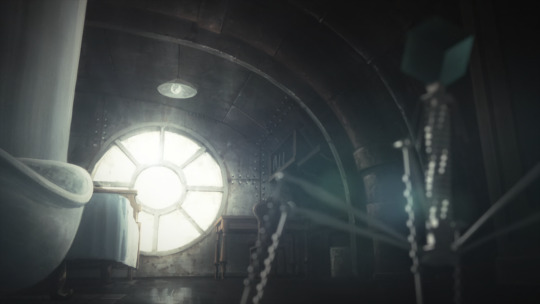

PE 104 May 29th/30th - Episode 4 happens. The radio states it has been 3 days since Jeneora Rock.
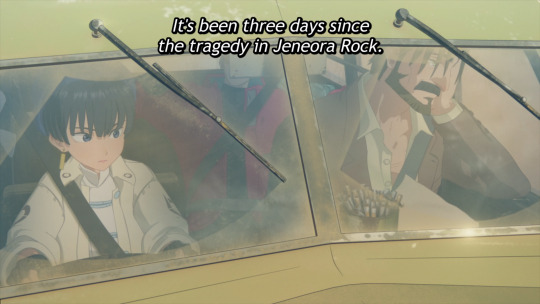
PE 104 May/June/July - Sometime in this period episode 5 happens. I suspect towards the mid/end of July since Vash and Wolfwood are still upset with each other over Rollo during the start of episode 6. (@ StudioOrange what happened during their off screen road trip we wanna know)
PE 104 ~ July 20th - Episodes 6/7 happen. The timing on this is entirely based on how long Vash remains passed out in Home before waking up, but at least one day passes from 6/7 to Vash's very bad no good day that is episodes 8/9/10/11/12 since it goes from day on 6 to sunset on 7, and then back to day when Vash wakes on the ship.
PE 104 July 21st - Episodes 8/9/10/11/12 aka Vash goes to Soup day aka the twin's 151st bday or thereabouts. We know for sure it was July 21st thanks to Nai giving his bro the worst bday present ever and the radio announcer confirming the date explicitly during the anniversary for the epilogue.
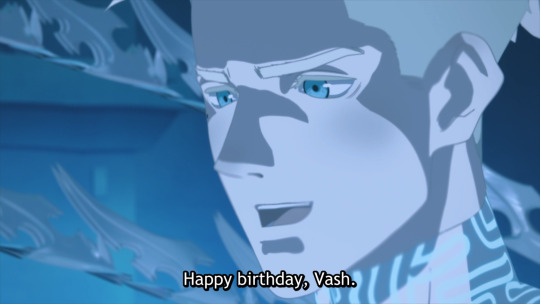
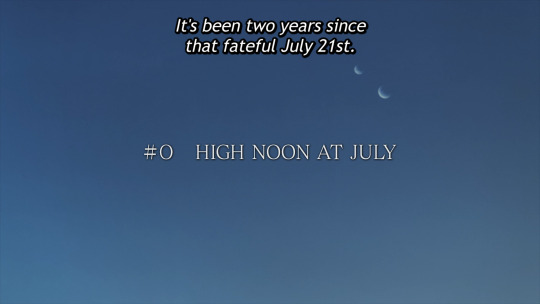
PE 106 July 21st (~ EY 2608) - Episode 12 epilogue happens as stated by the radio announcer.
BONUS: SE 110 June 2nd (~ EY 2612) - Now this is an interesting date, as this is the "effective" date listed on Wolfwood's pastor contract.

We do know for sure however that the date June 2nd SE110 cannot equal June 2nd PE110, and equal the current day and year, as this happens on July 21st. It also cannot be the date Wolfwood is sent after Vash as they meet up May 29/30th, and even if that date is wrong (like if more than a day passes between episodes 1 and 2 somehow), if the year was 110 then Meryl would be 29 years old, very much not a fresh out of college newbie since we know she also graduated in 103.
General theorizing from myself and the wonderful people who have commented on this post and on others post seem to align with SE possibly meaning Sinners Era and being slightly off from the Planet Era year system the rest of the planet uses.
For my personal theorizing, the closest match to this date is if SE110 is equivalent to PE104 (so a six year difference between year systems), and an extra 3 days happen between Episodes 1 and 2/3, then it may be the day Wolfwood was sent after Vash. It could also be that we are making the incorrect assumption that they are using the Earth calendar with Earth calendar month lengths. If May is 28 days then that would place Episode 4 on June 1st with my current timeline which would be even closer.
In summary: The important part is that Vash, Wolfwood, Meryl, and Roberto spend a total of about 2 months traveling together between May 25th and July 21st. And I have no fucking clue what's going on with Wolfwood's contract.
#trigun#trigun stampede#please appreciate this it took so long#if you see anything wrong that I need to correct please let me know#and if you have any theories about Wolfwood and his contract also please let me know cause I love over analyzing shit#random dribble
467 notes
·
View notes
Text
December 2024 - Update Schedule

December (u wot mate) chapter update schedule:
(Tier+ = This tier or any higher, as every higher tier accesses all rewards in lower cost tiers)
-
Sunday 1st - A Stain that Won't Dissolve 48
Tuesday 3rd - Constellations 13/16
Tuesday 10th - Underline the Gold 11/12
Thursday 12th - Underline the Black 103
Sunday 15th - A Stain that Won't Dissolve 50
Thursday 19th - Underline the Black 104
Tuesday 24th - Underline the Gold 12/13
Thursday 26th - Underline the Black 105
Sunday 29th - A Stain that Won't Dissolve 51
-
Stories with bonus updates as yet undetermined: Palmarosa and Smoke in Autumn (there will be at least one chapter this month)
Most chapters go up between 6-7pm GMT+8 (or the time that you’re already used to me putting chapters up, lol).
~
As always, you can support the stories you love by subscribing over at Patreon and Ream! In exchange you can get early access to a whole bunch of chapters (9 extra chapters currently!) that aren’t currently on AO3, chapter commentaries which often include small spoilers, and even merch!
You can also follow over there for free, and just get email notifications of news and other things that I release to everyone - and get the schedule and round-up in your email inbox so you don’t need to look for them later. :D
#housekeeping#schedule#december schedule#underline the black#underline the gold#a stain that won't dissolve#constellations#december's gonna be FILTHY with chapters folks#they're gonna be slapping all over the place like an upturned net of salmon on a ship#...#it's not a weird metaphor stop looking at me like that
22 notes
·
View notes
Text
What Spartans Remain?
Because I went down the Halopedia rabbit hole and I'm an obsessive nut, I've put together a list of all the Spartan-IIs, just to figure out who's alive, who's dead, who's missing, and the numbers which are unaccounted for
Alright so, there were at least 150 candidates considered for Spartan-IIs, half were conscripted, and of that 75, we have at least 50 named (or at least numbered) individuals
Alive (when last we saw them):
Jai-006
Naomi-010
Leon-011
Serin-019 (washout)
Robert-025
Douglas-042
Linda-058
Maria-062 (semi-retired)
Cassandra-075 (washout)
Fhajad-084 (washout)
Kelly-087
Jerome-092
Musa-096 (washout)
August-099
Fred-104
Adriana-111
John-117 (duh)
Michael-120
Alice-130
Definitely Dead:
Li-008 (2552)
Daisy-023 (unknown date during war, 2526-2552)
Joshua-029 (2552)
Otto-031 (2557)
Samuel-034 (2525)
Randall-037 (2556)
William-043 (2552)
Anton-044 (2552)
Kurt-051 (2552)
Jorge-052 (2552)
Margaret-053 (2557)
Malcolm-059 (2552)
Sheila-065 (2544)
Solomon-069 (2544)
Spartan-073 (2525)
Arthur-079 (2544)
Grace-093 (2552)
Victor-101 (2557)
Ralph-103 (unknown date during war, 2526-2552)
Oscar-129 (2525)
Cal-141 (2544)
Roma-143 (2557)
Unidentified Trainee (2525)
Unidentified Spartan (2531)
Maybe Dead:
James-005 (2552)
Vinh-030 (2552)
Isaac-039 (2552)
Beta-Romeo Actual (2552)
Red Fifteen (2552)
Red Four (2552)
Red Nineteen (2552)
Status unknown:
Kirk-018 (washout, possibly rehabilitated)
Keiichi-047 (alive as of 2531)
Soren-066 (alive as of 2527)
Rene-081 (washout, possibly rehabilitated)
Joseph-122 (alive as of 2525)
Carris-137 (alive as of 2520)
Spartans-116, 118, 119, 121, 123, and 124 (possibly the unidentified trainee and Spartan, as well ass Beta-Romeo Actual, Red-Fifteen, Red Four, and Red Nineteen)
Missing numbers:
Spartans number 001, 002, 003, 004, 007, 009, 012, 013, 014, 015, 016, 017, 020, 021, 022, 024, 026, 027, 032, 033, 035, 036, 038, 040, 041, 045, 046, 048, 049, 050, 054, 055, 056, 057, 060, 061, 063, 064, 067, 068, 070, 071, 072, 074, 076, 077, 078, 080, 082, 083, 085, 086, 088, 089, 090, 091, 094, 097, 098 (according to the silver timeline, Spartan-098 is named "Nora"), 100, 102, 105, 106, 107, 108, 109, 110, 112, 113, 114, 115, 126, 127, 128, 131, 132, 133, 135, 136, 138, 139, 140, 142, 145, 146, 147, 148, 149, 150 (I'm sure I messed up somewhere)
obviously given that not all 150 candidates were recruited, some (about 70) of these numbers did not actually become Spartans, trainees or otherwise, such as Caleb-095, the father of Olympia Vale
Additionally, Spartans-028 (Riz), 125 (Kai), and 134 (Vanak) do exist per 343's internal documentation, but as of yet have not appeared in the Prime timeline
therefore there are about 19 confirmed living Spartans, 24 confirmed dead, 7 possible dead, and 12 unknowns, for a total of 62 (or 65 counting the silvers), so there are at least 10-13 other Spartans we have not met, be they active, retired, washout, dead, or missing
#wooloo-writes#wooloo writes#halo#halopedia#spartan ii#halo spartan#naomi 010#jai 006#leon 011#serin 019#robert 025#douglas 042#linda 058#maria 062#cassandra 075#fhajad 084#kelly 087#jerome 092#musa 096#august 099#fred 104#adriana 111#john 117#michael 120#alice 130#i only tagged the living ones because c'mon#i can't tag them all#there's over 50#halo eu#halo expanded universe
123 notes
·
View notes
Text
A guide on writing Charlotte Roselei (or, how I do it at least)
Okay. So. This is another one where I've written this over and over, trying to put into words how I write her and, honestly, the best advice I've got is to remember that she has goals and ambitions and personality outside of a romantic relationship.
(I have already done a bit of a meta on her and how her curse affects her here if you want to check that out)
The first thing I do when writing Charlotte is to ignore 90% of what goes on with her in canon. If it involves romance, ignore it for now. We're going to focus on the other facts.
So. What do we know about Charlotte Roselei and how do those facts effect her personality?
1) she was cursed as a little girl.
There is no arguing with this point. Yami straight up says it. The actual age is debatable, but the curse itself is not.
2) she seems to have a strained relationship with her parents.
This point comes from the flashback in Volume 12 (Chapter 104 if you want to check it out yourself), where she is the one reassuring her parents about her curse. Her parents never come up again.
3) she takes everything onto her own shoulders and sees a lot of things as personal failings when they're not.
Again, this point comes from the flashback in Volume 12, while we see several other people calling it "the curse on House Roselei" (the person laying the curse says "a curse on you, House Roselei), Charlotte always says "my curse". And when she can't hold it back, she calls herself pathetic.
4) she gets told something is impossible and tries to do it anyway.
For the final time, we're looking at the flashback in volume 12. Charlotte herself says that the only way to break the curse is for her to have her heart stolen by a man. And yet. The very first thing she says after being cursed is "I'll get stronger! Stronger than anyone! I'll overcome this curse!"
5) despite her calm and collected facade, she's actually a fairly dramatic person.
We see this literally every time we get to see her internal monologue. She wails and pulls faces and overall is just a bit of a mess. Also. Her go-to reaction when annoyed by someone is to attack them with briars, generally throwing the person in question up into the air. Sure, this general comes with a verbal smack down, but most of the time there was no need for her to react that, well, dramatically.
And the star festival (Chapter 103). When that guy tries to use her as arm candy and he goes "Don't you know who I am?" Her response? "Who you are? Don't you know who I am?" followed by her pulling noble rank on him, complete with wrapping the guy up in briars.
6) she has a problem with men.
I don't think this one really needs explaining. Personally, I prefer to interpret this as her having a problem with the trend of men objectifying her rather than a problem with men as a whole, but there is no denying she has a problem with men. And I can't really blame her, to be honest. If I had men I didn't really know randomly proposing to me in the streets, I'd have a problem too.
7) she is given multiple chances to drop out of the fighting during Spade and choses not to. (in other words, she doesn't know when to quit)
I don't think this point really needs any explanation. Every time she gets knocked down, she gets right back up again. To the point that, without Mimosa's intervention, she would have died.
Other fun facts about her that come with the volume extras (@/thoughfullyrainynightmare has compiled some of the volume extras here and here).
She's the most beautiful woman (as long as she doesn't have her helmet on)
She's the third smartest Captain
She's the worst (in the entire kingdom) at handling her alcohol
She's got the third biggest fan club out of the magic knights
She's got the second worst talent/taste in art
Her character profile (volume 7) tells us that she's 171 cm tall, her birthday September 18th, she's a virgo, her blood type is A and that she likes relaxing moments in the garden at her private residence. (it also specifies that she likes Yami while disliking most other men, but we're ignoring that for now).
Her stats in the data book look like this (though these numbers are sourced from the wiki as the data book has yet to be translated into English, so take them with a pinch of salt)
Physical Strength: 4/5 Magic Amount: 5/5 Magic Control: 5/5 Magic Sensing: 3/5 Cleverness: 4/5 And her extra stat is Honesty, with a score of 0/5 (interestingly enough, as far as I know, she's the only person to have 0/5 for her extra stat instead of 5/5).
The wiki also has stats for a card that came with volume 12, but, again, I'd take these numbers with a pinch of salt as I've never seen the card myself.
Magic Attribute: Briar Magic Magic: 1400 Affiliation: Blue Rose Type: Attack Leaves: 3 Power: 3/5 Magical: 4/5 Wisdom: 5/5 Stamina: 3/5 Vitality: 4/5
I also want to point out the anime-only Heart Training Arc. When Charlotte first arrives, she says "So this is what mages are capable of in the Heart kingdom" with a look on her face that, to me, screams "filing that away in case we ever have to face you". Because Charlotte is the eldest of the mages they send to Heart. By a significant margin. There's six years between her and the next oldest, Finral. She also struggles with understanding Sarado's initial explanation, but when her time in Heart is recapped in the manga (volume 28), we get Potrof calling her a genius, implying she picked up Heart's mana method very quickly one she understood what she was supposed to be doing.
Putting all of this information together, we have a character who is very smart and very powerful (and knows it). She holds herself to a very high standard and appears to hold others to those same standards. If something goes wrong and she's involved, it's her fault, so nothing can ever go wrong, which likely leads to her double and triple checking everything and not delegating tasks as much as she should. She is someone who has been placed on a pedestal and is constantly trying to live up to the expectations that come with it. People are enamoured with the idea of Charlotte Roselei, but don't know who she actually is.
And, taking a break to look at the romance for a moment here, one of the key parts of her personality is that she doesn't know how to ask for help. We see this time and time again with her trying to ask Yami out.
So, how do I write Charlotte?
My interpretation of her is a woman who knows what she wants and goes for it. Who doesn't understand the phrases "reasonable human limits" or "it's impossible". If she wants something doing, she does it herself. I also tend to characterise her as petty and prone to jealousy. She's a skilled liar with a brilliant poker face (providing she isn't drunk). She keeps all her cards very close to her chest and doesn't volunteer information easily. She was isolated during a key point in her development (thanks to her curse) so she struggles with interacting with people, especially her peers. She's overly formal and doesn't understand a lot of slang. She's a little (or a lot) touch starved.
I interpret her trying to break her curse as her doing a lot of research into curses and as many different ways of using mana as she could get her hands on (which, as a noble, would be a lot) as well as doing plenty of training to work on her control. 5/5 for control has to be earnt. She pushes herself until she's exhausted and then gets up and does the exact same thing the next day. And the next. And the next. Because there is a clock ticking down above her head and every second could be the difference between her breaking the curse and her failing to control it.
I see her as a little- not suicidal, but reckless with her own life in her time in the magic knights between joining and her curse being broken/lifted/deactivated/whatever. She's going to suffer a fate worse than death when she turns eighteen anyway, and if she's going to die, she might as well die doing something useful. After the curse is broken, she is very aware that she's living on borrowed time, that every breath could be her last.
And, underneath it all, she's a little bit feral. She's not sadistic, but there's a clear line between Us and Them and there are times when she's almost begging Them to give her an excuse to let loose.
11 notes
·
View notes
Text
season 2, episode 1 part four continued
100. Magnus: you’re lucky you’re cute


101. it’s not like Alexander took hours working up the courage??????? Alec: I had to learn how to apologize so no big deal darling


102. Malecs first fight handled
I love seeing the emotion in both of their expressions from how hurt Magnus is, Alec realizing how his actions and words affected Magnus, and overcoming all of that while they have a discussion about it
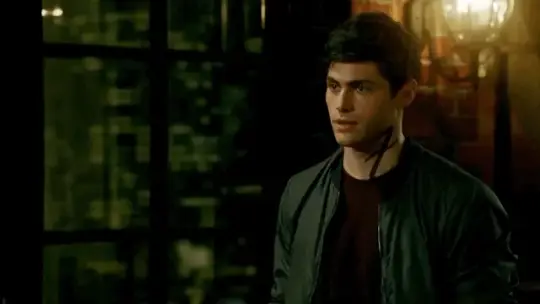
103. I’m in awe of how they handled it. I watched the show first but when I read the books, this is how I wanted their relationship to be in the books. sadly we didn’t get that but at least the show committed and brought us this Malec. I couldn’t believe how toxic and unbearable Malec book version is after all those ugh book fans said it’s better. yeah, because they weren’t the main focus. show Malec always has my heart
104. I love how this little scene was improvised because Harry was trying to get Matt to smile

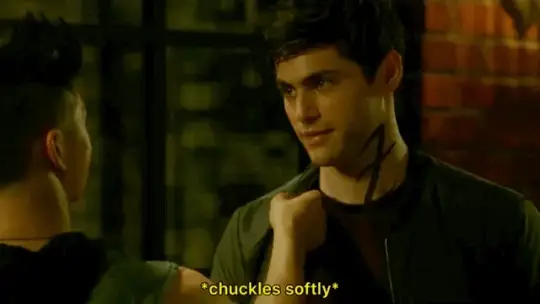
105. THIS IS THE SMILE WE LOVE

106. also can we talk about how Alec apologized twice but this is the time where he finally hears what Magnus is saying and he’s comprehending that. IM SORRY I JUST LOVE THEM SO MUCH
107. real talk- show Malec gets shit done. another one of my fav parallels coming up:
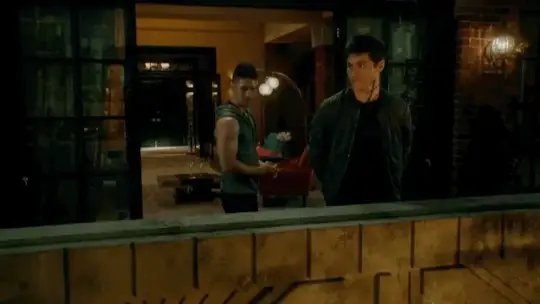



108. also on a real note, is there any parallel that I don’t love? (JUST THAT ONE THAT MAKES ME EMOTIONAL and maybe some know which one I’m talking about that hits season three)
109. and we shouldn’t be too hard on Alec because this is his very first relationship and he’s doing so well so far 👏🏼
110. Simon: it’s nice when that arrogant self conceited shadowhunter dick isn’t here


111. okay they actually look happy here

112. I think they’re nice together but I still believe Simon loves clary more than she loves Simon. because would she be around Simon if jace was a choice? would she chose Simon if jace was a choice?
113. might be the only time I approve of Jocelyn

114. this was on my last discussion post but I found the gif and that’s my reaction to listening to shadowhunters being hypocrites and dumb


115. well hello Alec

116. forgot to post this one also. ALEC JUST DECIMATING EVERYONE

117. Magnus: what the fuck, I just started

118. it’s a good thing alec has a powerful warlock on standby

119. but are we supposed to watch the Valentine and jace stuff and think jace is actually better and not turning into Valentine? because 1. he cuts Hodges hand off, 2. he joins Valentine and then when he has a chance to surrender himself, 3. he joins Valentine once again. Alec is going to be fighting for his fucking life for the consequences of jace’s actions. and this is what I mean, alec is always paying for his choices. I JUST WISH ALEC WOULD HAVE CUT HIM OFF FOR REAL (fantasy version of mine- alec cuts him off for real and Alec and Magnus and Izzy are so happy)
120. well this is awkward (posting Jocelyn one again because it’s nice to see someone trying to end jace, I appreciate the effort)



121. don’t you hate it when you go and kill some downworlders and your sister/want to be girlfriend and mom/not mom sees??????
122. aldertree: I don’t trust y’all to find jace so I got this and also keep them here

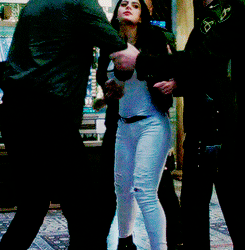
123. forgot to post this too. I love seeing clary’s “I think I know I’m better than you” irritating ass get handled by Alec in season one and now Izzy

124. Simon: im a lot faster so thank me

125. also note that instead of staying and returning to the institute, jace goes with Valentine. he has once again chosen to go with Valentine. so I don’t care what anyone says but he deserved to be arrested for all the shit he pulled PLUS PUT ALEC THROUGH. Alec has almost died twice by trying to save jace so far. everything that has happened since episode 13 of season 1- jace is 100% to blame.
125 is the number and that is it for season 2, episode 1 🥰 thank you for joining malecs first official fight discussion post and we still hate jace and clary debate 👏🏼 I’ll be doing the second one probably in a couple of days give or take. but thank you anyone who endures my posts and me ✨
#anti cassandra clare#anti cc#just my stupid opinions#alec lightwood#magnus bane#anti jace herondale#anti clary fray#shadowhunters tv#show alec is superior#anti clace#show magnus is superior#show malec is superior#putting anti cc on all show shadowhunter posts because i don’t want an pro book fans hating on my shit#shadowhunter show is superior#Alec knows how to make it up to Magnus#as if Magnus wasn’t going to forgive Alec lmao#125 is the number#marking this as 2x01
16 notes
·
View notes
Text
Socra’s Liveblog, Ep. 101-110
Ep 101:
-aw I like seeing the whole squad being dumb kids together (especially Sasuke, bro’s been going through a lot lately)
-I guess Kakashi could just hide his face when he eats but have the kids really never seen him eat before?
-the random ninja’s voice is so stupid-sounding
-this episode is so weird but im kinda here for it
-the Team 7 trio are really cute in this episode! We’ve been following just Naruto for a while so it was nice to see them all together again
-also I live for Kakashi being a troll
Ep 102:
-I know that Team 7 has Sasuke and Naruto on it but maaaaaybe three genin shouldn’t be sent out alone on a potentially A-ranked mission? Like at least send a chunin with them or something
-I’m not sure how old this Idate dude is but I really didn’t like how he was flirting with Sakura
-the animation of Idate running was kinda hilarious
Ep 103:
-the Councilman guy looks and sounds so pompous
-Jirocho is kinda goated actually
-OH SHIT THE ILLUSION GUYS FROM THE CHUNIN EXAMS ARE BACK! That’s actually kinda cool, I never expected to see them again
-there was actually good teamwork between Team 7 working together to catch Idate when he fell off the cliff
-I somehow haven’t mentioned it in this entire series but I just gotta say that I find the classic Naruto running pose hilarious
-ah I kinda missed Sakura roasting Naruto
-I love how when they were talking about the chunin exams there was just a random cut of Naruto punching the shit out of Neji. Rip Neji.
-oooooooh I wasn’t expecting Idate to be related to an existing character, much less Ibiki. I actually thought something about his name was familiar when he first said it but I didn’t make the connection
-can the boys PLEASE give Sakura an active role instead of her being a lookout/guard
-wait was the fire in Idate’s memories how Ibiki got most of his scars???
-I really wanna know what Idate’s ninja-related trauma is
-OKAY LET'S GO SAKURA!!!!!! Her ripping the mast out and clobbering multiple clones with it was actually pretty great
-I know this Aoi guy is evil or whatever but I like his hair and face, he’s kinda slaying (his outfit totally sucks tho)
Ep 104:
-I know that this is filler but it’s cool to see the rasengan carrying over from the last canon arc
-Naruto carrying Sakura out of the water was good, I like when it’s shown how much the kids care about each other
-but also the threat of Naruto attempting mouth-to-mouth being what revived Sakura was hilarious
-Aoi’s voice actor is doing a very good job of being a smug asshole
-Idate’s race opponent really stopped to take a break? It’s giving The Tortoise and The Hare lol
-okay so between Aoi and that guy who tricked Naruto into stealing the scroll in the first episode (oh and also Orochimaru), the Leaf village REALLY needs to do a better job of psychologically screening their ninja
-wow for being filler, this is actually doing a good job of showcasing Naruto’s character and how his past experiences have affected him
Ep 105:
-Naruto hauling someone bigger than him up a gazillion steps is actually kinda impressive, bro’s strong as shit
-damn Ibiki really didn’t need to be so cryptic about answering Idate’s questions
-Idate says that his brother failing him and telling him he could never be a chunin made him lose trust in ninja but like…….. I really think that Aoi tricking him is a much bigger deal
-Aoi’s sword is literally just a lightsaber (sound effects and all lol)
-wow Aoi is somehow more evil than I thought
-also Ibiki is metal as hell
-oh Sasuke is PISSED
-also I just realized that Sasuke has lost way more fights than he’s won so far-
Ep 106:
-yay for Sakura saving Sasuke! She still hasn’t gotten to do too much tho:(
-Naruto is Shonen MC-ing once again
-the animation of Aoi spinning after Naruto hit him with a rasengan was so bad but also so funny
-Idate letting Naruto use his prized knife was a good character development moment
-it’s actually a good touch that Idate mostly does the classic Naruto run while his opponent runs regularly, it shows that he used to train as a ninja
-the lord pulling an Uno Reverse card on the opposing family head when he tried to use a photo to disqualify Idate was hella satisfying
-I’m assuming Ibiki pretended not to recognize Idate because he didn’t want to have to arrest him as a traitor or something like that
-oop Sasuke’s got a pretty intense inferiority complex going, sure hope that doesn’t lead anywhere hahahahaha-
-that was actually a pretty good filler arc! It had some nice character moments, and it was good to see Team 7 doing a mission before stuff inevitably goes to shit
Ep 107:
-oh shittttt Naruto and Sasuke are gonna fight??? I’m excited but also very scared bc if Sasuke loses it’s gonna be BAD
-awww Shikamaru got promoted!
-Sasuke needs to get his ass to therapy ASAP, that shit is years overdue at this point
-I do kinda love Team 10’s dynamic. They do a lot of kinda sibling-like squabbling and teasing, which I enjoy (Choji and Ino fighting over the last piece of meat was so good)
-…highkey Team 7’s dynamic as a team interests me the least
-Shikamaru reassuring Choji that he can get girls and that he doesn’t need to change his ways was actually really nice, he seems more mature already after his promotion
-I feel like we needed more of an organic buildup of Sasuke’s inferiority complex and frustration. The level of aggressiveness he has towards Naruto/in general seems really out-of-place, ESPECIALLY if the viewer didn’t watch the previous filler arc. I guess the curse mark is involved, but it still just feels like an abrupt shift in his character
-wow Sasuke didn’t even bother to put his shoes on to fight Naruto
-so Naruto has absolutely zero tact but he’s also able to immediately AND accurately assess that Sasuke is ashamed of being “weaker” than him, which is actually pretty impressive
-these kids are full-out brawling on the roof (most notably Sasuke spewing fire everywhere) and no one is coming to stop them? Aren’t there ninja on watch or something? Kakashi we need youuuu
Ep 108:
-I still need an explanation for why one of Orochimaru’s goons has SIX ARMS and one of them has TWO FUCKING HEADS????
-yay Kakashi’s here to knock some sense into these little idiots
-actually nevermind, Kakashi is NOT equipped to handle this so can he force Sasuke to get counseling or something
-does Konoha not have patrols and people watching its perimeter???? Why are Orochimaru’s goons able to get in so easily
-Kakashi please give Sakura a hug. Kakashi stop talking to Jiraiya and comfort your fucking student. Kakashi please.
-okay he at least gave her some comforting words. Good job Kakashi you did the bare minimum for one of your three students.
-goddamnit I just wanna hug Sakura. She keeps having to deal with the boys’ shit
-I’ve decided that besides Orochimaru himself, literally none of Orochimaru’s followers (aka Kabuto and the four goons) have any drip. Orochimaru himself is only saved by his hair and makeup, because his outfit is just as ugly as the others’
-Kakashi’s lecture to Sasuke actually wasn't too bad but I wish he hadn’t left him so abruptly
Ep 109:
-once again this show is making me crave ramen
-oh I completely forgot that Naruto didn’t know about Sasuke’s curse mark
-Sasuke seriously can’t get a break from taking constant Ls
-heeey Sasuke I know you have a boatload of unprocessed trauma and are also only 12 years old and thus are not the most reasonable and logical of people, but maybe DON’T go to the guy who bit you and cursed you and literally killed the leader of your village-
-god this scene with Sasuke and Sakura is breaking my heart.
-see I was liking what Sakura was saying until she started talking about her love for Sasuke and how him leaving would make her feel completely alone. Sakura honey you deserved better writing
-I did like that Sasuke’s last line to Sakura before he knocked her out was “Thank you for everything”. That hit unexpectedly hard for me
Ep 110:
-I can’t believe Tsunade is sending Shikamaru, a freshly-promoted chunin, on a potentially SUPER dangerous mission. No pressure I guess?
-Shikamaru summoning Choji with chips was hilarious. I kinda love them
-damn I wish we could have gotten Shino on the squad. I wanna see him kick ass more
-YAY LEE’S OKAY (I knew he would be but yippee for Lee!)
-also aw Neji was helping Lee walk
-anyways I’m mad they didn’t bring any of the girls >:( (Tenten especially could have used screentime to show her stuff)
-I like that Shikamaru’s plan is laid out like a Shogi board, that was a cute detail and gives good insight into his thought process
-wow Shikamaru is actually doing a great job
-god can SOMEONE GIVE SAKURA A MOTHERFUCKING HUG
15 notes
·
View notes
Note
Is there a panel in the manga where Kira’s kill count is outwardly confirmed as a certain number?
really good question!! from what i can remember they generally keep it pretty vague, but here's a few of the somewhat more direct references i could find. if someone can find something better pls pls pls add it i'd like to see as well owo
from chapter 60 (time skip after L's death):



in most cases where the narration talks about the effect of KIRA, they stick to talking about the reactions to the deaths rather than the exact number of deaths themselves. clearly though, the world has been drastically changed-- see the twin towers still standing in the DN universe as shown in the last panel.


from the same chapter, a couple shinigami comment about the worry that they might run out of people if humans keep dying at the rate that they are. this is almost immediately made pushed back against by the implication that these shinigami are particularly out of the loop when it comes to human populations, but the fact that it stood out at all to the point where they could have such a worry in the first place seems notable.
a bit later, in chapter 75 we also get this:

light calls KIRA an undeniable "mass murderer," and that public anonymous surveys show a majority of people are in support of KIRA. (where these surveys take place is not mentioned-- i'm assuming this is either for japan or worldwide.)
at the end, in chapters 103, 104, and onward, we also get a Lot of looks into what the pages of the death note look like themselves:


for that last panel in particular-- this doesn't even appear to be the full page, but from what i can count that's about 6 columns by 28 rows for this one page alone, making about 168 names a page. iirc mikami was writing about a page or two a night while he was at his peak as KIRA, so. you can do the math.
or, actually, if you don't want to-- the film theorists channel did a video on this exact subject. idk how trustworthy it is since i believe they take from the anime too, not just the manga, but it's a fascinating source regardless and i like how they break down each individual KIRA.
youtube
TL;DR: light definitely writes the most names as presumably he is Going At It during the time skip with basically nothing standing in his way for at least 5 or so years. misa also writes a lot, though her numbers potentially vary a lot depending on how much light was relying on her eyes during that same time. mikami also by far has the highest rate of kills, again packing All That Shit into one page on the reg, though he doesn't work as KIRA for very long.
#asks#broadcasts from the astronaut#death note#hope that somewhat helps anon askjdfasjfakl#they really don't get very specific about it which i think is kind of intentional#the more important detail is always how The Public is reacting to KIRA and clearly he is doing enough to be noticed and cause#significant political waves-- at least for a while#might check c- and a-kira l8r too but im kinda in a rush oops
9 notes
·
View notes
Text
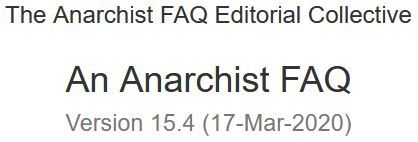
I.1.2 Is libertarian communism impossible?
In a word, no. While the “calculation argument” (see last section) is often used by propertarians (so-called right-wing “libertarians”) as the basis for the argument that communism (a moneyless society) is impossible, it is based on certain false ideas of what prices do, the nature of the market and how a communist-anarchist society would function. This is hardly surprising, as Mises based his theory on a variation of neo-classical economics and the Marxist social-democratic (and so Leninist) ideas of what a “socialist” economy would look like. So there has been little discussion of what a true (i.e. libertarian) communist society would be like, one that utterly transformed the existing conditions of production by workers’ self-management and the abolition of both wage-labour and money. However, it is useful here to indicate exactly why communism would work and why the “calculation argument” is flawed as an objection to it.
Mises argued that without money there was no way a socialist economy would make “rational” production decisions. Not even Mises denied that a moneyless society could estimate what is likely to be needed over a given period of time (as expressed as physical quantities of definite types and sorts of objects). As he argued, “calculation in natura in an economy without exchange can embrace consumption-goods only.” His argument was that the next step, working out which productive methods to employ, would not be possible, or at least would not be able to be done “rationally,” i.e. avoiding waste and inefficiency. The evaluation of producer goods “can only be done with some kind of economic calculation. The human mind cannot orient itself properly among the bewildering mass of intermediate products and potentialities without such aid. It would simply stand perplexed before the problems of management and location.” Thus we would quickly see “the spectacle of a socialist economic order floundering in the ocean of possible and conceivable economic combinations without the compass of economic calculation.” [“Economic Calculation in the Socialist Commonwealth”, pp. 87–130, Collectivist Economic Planning, F.A. von Hayek (ed.), p. 104, p. 103 and p. 110] Hence the claim that monetary calculation based on market prices is the only solution.
This argument is not without its force. How can a producer be expected to know if tin is a better use of resources than iron when creating a product if all they know is that iron and tin are available and suitable for their purpose? Or, if we have a consumer good which can be made with A + 2B or 2A + B (where A and B are both input factors such as steel, oil electricity, etc.) how can we tell which method is more efficient (i.e. which one used least resources and so left the most over for other uses)? With market prices, Mises’ argued, it is simple. If A cost $10 and B $5, then clearly method one would be the most efficient ($20 versus $25). Without the market, Mises argued, such a decision would be impossible and so every decision would be “groping in the dark.” [Op. Cit., p. 110]
Mises’ argument rests on three flawed assumptions, two against communism and one for capitalism. The first two negative assumptions are that communism entails central planning and that it is impossible to make investment decisions without money values. We discuss why each is wrong in this section. Mises’ positive assumption for capitalism, namely that markets allow exact and efficient allocation of resources, is discussed in section I.1.5.
Firstly, Mises assumes a centralised planned economy. As Hayek summarised, the crux of the matter was “the impossibility of a rational calculation in a centrally directed economy from which prices are necessarily absent”, one which “involves planning on a most extensive scale — minute direction of practically all productive activity by one central authority”. Thus the “one central authority has to solve the economic problem of distributing a limited amount of resources between a practically infinite number of competing purposes” with “a reasonable degree of accuracy, with a degree of success equally or approaching the results of competitive capitalism” is what “constitutes the problem of socialism as a method.” [“The Nature and History of the Problem”, pp. 1–40, Op. Cit., p. 35, p. 19 and pp. 16–7]
While this was a common idea in Marxian social democracy (and the Leninism that came from it), centralised organisations are rejected by anarchism. As Bakunin argued, “where are the intellects powerful enough to embrace the infinite multiplicity and diversity of real interests, aspirations, wishes, and needs which sum up the collective will of the people? And to invent a social organisation that will not be a Procrustean bed upon which the violence of the State will more or less overtly force unhappy society to stretch out?” Moreover, a socialist government, “unless it were endowed with omniscience, omnipresence, and the omnipotence which the theologians attribute to God, could not possibly know and foresee the needs of its people, or satisfy with an even justice those interests which are most legitimate and pressing.” [Bakunin on Anarchism, pp. 268–9 and p. 318] For Malatesta, such a system would require “immense centralisation” and would either be “an impossible thing to achieve, or, if possible, would end up as a colossal and very complex tyranny.” [At the Café, p. 65]
Kropotkin, likewise, dismissed the notion of central planning as the “economic changes that will result from the social revolution will be so immense and so profound … that it will be impossible for one or even a number of individuals to elaborate the social forms to which a further society must give birth. The elaboration of new social forms can only be the collective work of the masses.” [Words of a Rebel, p. 175] The notion that a “strongly centralised Government” could ”command that a prescribed quantity” of a good “be sent to such a place on such a day” and be “received on a given day by a specified official and stored in particular warehouses” was not only “undesirable” but also “wildly Utopian.” During his discussion of the benefits of free agreement against state tutelage, Kropotkin noted that only the former allowed the utilisation of “the co-operation, the enthusiasm, the local knowledge” of the people. [The Conquest of Bread, pp. 82–3 and p. 137]
Kropotkin’s own experience had shown how the “high functionaries” of the Tsarist bureaucracy “were simply charming in their innocent ignorance” of the areas they were meant to be administrating and how, thanks to Marxism, the socialist ideal had “lost the character of something that had to be worked out by the labour organisations themselves, and became state management of industries — in fact, state socialism; that is, state capitalism.” As an anarchist, he knew that governments become “isolated from the masses” and so “the very success of socialism” required “the ideas of no-government, of self-reliance, of free initiative of the individual” to be “preached side by side with those of socialised ownership and production.” Thus it was essential that socialism was decentralised, federal and participatory, that the “structure of the society which we longed for” was “worked out, in theory and practice, from beneath” in by “all labour unions” with “a full knowledge of local needs of each trade and each locality.” [Memoirs of a Revolutionist, p. 184, p. 360, p. 374–5 and p. 376]
So anarchists can agree with Mises that central planning cannot work in practice as its advocates hope. Or, more correctly, Mises agreed with the anarchists, as we had opposed central planning first. We have long recognised that no small body of people can be expected to know what happens in society and plan accordingly (“No single brain nor any bureau of brains can see to this organisation.” [Issac Puente, Libertarian Communism, p. 29]). Moreover, there is the pressing question of freedom as well, for “the despotism of [the ‘socialist’] State would be equal to the despotism of the present state, increased by the economic despotism of all the capital which would pass into the hands of the State, and the whole would be multiplied by all the centralisation necessary for this new State. And it is for this reason that we, the Anarchists, friends of liberty, we intend to fight them to the end.” [Carlo Cafiero, “Anarchy and Communism”, pp. 179–86, The Raven, No. 6, p. 179]
As John O’Neill summarises, the “argument against centralised planning is one that has been articulated within the history of socialist planning as an argument for democratic and decentralised decision making.” [The Market, p. 132] So, for good economic and political reasons, anarchists reject central planning. This central libertarian socialist position feeds directly into refuting Mises’ argument, for while a centralised system would need to compare a large (“infinite”) number of possible alternatives to a large number of possible needs, this is not the case in a decentralised system. Rather than a vast multitude of alternatives which would swamp a centralised planning agency, one workplace comparing different alternatives to meet a specific need faces a much lower number of possibilities as the objective technical requirements (use-values) of a project are known and so local knowledge will eliminate most of the options available to a small number which can be directly compared.
As such, removing the assumption of a central planning body automatically drains Mises’ critique of much of its force — rather than an “the ocean of possible and conceivable economic combinations” faced by a central body, a specific workplace or community has a more limited number of possible solutions for a limited number of requirements. Moreover, any complex machine is a product of less complex goods, meaning that the workplace is a consumer of other workplace’s goods. If, as Mises admitted, a customer can decide between consumption goods without the need for money then the user and producer of a “higher order” good can decide between consumption goods required to meet their needs.
In terms of decision making, it is true that a centralised planning agency would be swamped by the multiple options available to it. However, in a decentralised socialist system individual workplaces and communes would be deciding between a much smaller number of alternatives. Moreover, unlike a centralised system, the individual firm or commune knows exactly what is required to meet its needs, and so the number of possible alternatives is reduced as well (for example, certain materials are simply technically unsuitable for certain tasks).
Mises’ other assumption is equally flawed. This is that without the market, no information is passed between producers beyond the final outcome of production. In other words, he assumed that the final product is all that counts in evaluating its use. Needless to say, it is true that without more information than the name of a given product it is impossible to determine whether using it would be an efficient utilisation of resources. Yet more information can be provided which can be used to inform decision making. As socialists Adam Buick and John Crump point out, “at the level of the individual production unit or industry, the only calculations that would be necessary in socialism would be calculations in kind. On the one side would be recorded the resources (materials, energy, equipment, labour) used up in production and on the other the amount of good produced, together with any by-products… . Socialist production is simply the production of use values from use values, and nothing more.” [State Capitalism: The Wages System Under New Management, p. 137] Thus any good used as an input into a production process would require the communication of this kind of information.
The generation and communication of such information implies a decentralised, horizontal network between producers and consumers. This is because what counts as a use-value can only be determined by those directly using it. Thus the production of use-values from use-values cannot be achieved via central planning, as the central planners have no notion of the use-value of the goods being used or produced. Such knowledge lies in many hands, dispersed throughout society, and so socialist production implies decentralisation. Capitalist ideologues claim that the market allows the utilisation of such dispersed knowledge, but as John O’Neill notes, “the market may be one way in which dispersed knowledge can be put to good effect. It is not … the only way”. “The strength of the epistemological argument for the market depends in part on the implausibility of assuming that all knowledge could be centralised upon some particular planning agency” he stresses, but Mises’ “argument ignores, however, the existence of the decentralised but predominantly non-market institutions for the distribution of knowledge … The assumption that only the market can co-ordinate dispersed non-vocalisable knowledge is false.” [Op. Cit., p. 118 and p. 132]
So, in order to determine if a specific good is useful to a person, that person needs to know its “cost.” Under capitalism, the notion of cost has been so associated with price that we have to put the word “cost” in quotation marks. However, the real cost of, say, writing a book, is not a sum of money but so much paper, so much energy, so much ink, so much human labour. In order to make a rational decision on whether a given good is better for meeting a given need than another, the would-be consumer requires this information. However, under capitalism this information is hidden by the price.
Somewhat ironically, given how “Austrian” economics tends to stress that the informational limitations are at the root of its “impossibility” of socialism, the fact is that the market hides a significant amount of essential information required to make a sensible investment decision. This can be seen from an analysis of Mises’ discussion on why labour-time cannot replace money as a decision-making tool. Using labour, he argued, “leaves the employment of material factors of production out of account” and presents an example of two goods, P and Q, which take 10 hours to produce. P takes 8 hours of labour, plus 2 units of raw material A (which is produced by an hour’s socially necessary labour). Q takes 9 hours of labour and one unit of A. He asserts that in terms of labour P and Q “are equivalent, but in value terms P is more valuable than Q. The former is false, and only the later corresponds to the nature and purpose of calculation.” [“Economic Calculation in the Socialist Commonwealth”, Op. Cit., p. 113]
The flaw in his argument is clear. Assuming that an hour of socially necessary labour is £10 then, in price terms, P would have £80 of direct labour costs, with £20 of raw material A while Q would have £90 of direct labour and £10 of A. Both cost £100 so it hard to see how this “corresponds to the nature and purpose of calculation”! Using less of raw material A is a judgement made in addition to “calculation” in this example. The question of whether to economise on the use of A simply cannot be made using prices. If P, for example, can only be produced via a more ecologically destructive process than Q or if the work process by which P is created is marked by dull, mindless work but Q’s is more satisfying for the people involved than Q may be considered a better decision. Sadly, that kind of information is not communicated by the price mechanism.
As John O’Neill points out, “Mises’ earlier arguments against socialist planning turned on an assumption about commensurability. His central argument was that rational economic decision-making required a single measure on the basis of which the worth of alternative states of affairs could be calculated and compared.” [Ecology, Policy and Politics, p. 115] This central assumption was unchallenged by Taylor and Lange in their defence of “socialism”, meaning that from the start the debate against Mises was defensive and based on the argument that socialist planning could mimic the market and produce results which were efficient from a capitalist point of view.
Anarchists question whether using prices means basing all decision making on one criterion and ignoring all others is a rational thing to do. As O’Neill suggests, “the relative scarcity of items … hardly exhaust the full gamut of information that is distributed throughout society which might be relevant to the co-ordination of economic activities and plans.” [The Market, p. 196] Saying that a good costs £10 does not tell you much about the amount of pollution its production or use generates, under what conditions of labour it was produced, whether its price is affected by the market power of the firm producing it, whether it is produced in an ecologically sustainable way, and so forth. Similarly, saying that another, similar, good costs £9 does not tell you whether than £1 difference is due to a more efficient use of inputs or whether it is caused by imposing pollution onto the planet.
And do prices actually reflect costs? The question of profit, the reward for owning capital and allowing others to use it, is hardly a cost in the same way as labour, resources and so on (attempts to explain profits as an equivalent sacrifice as labour have always been ridiculous and quickly dropped). When looking at prices to evaluate efficient use for goods, you cannot actually tell by the price if this is so. Two goods may have the same price, but profit levels (perhaps under the influence of market power) may be such that one has a higher cost price than another. The price mechanism fails to indicate which uses least resources as it is influenced by market power. Indeed, as Takis Fotopoulos notes, ”[i]f … both central planning and the market economy inevitably lead to concentrations of power, then neither the former nor the latter can produce the sort of information flows and incentives which are necessary for the best functioning of any economic system.” [Towards an Inclusive Democracy, p. 252] Moreover, a good produced under a authoritarian state which represses its workforce could have a lower price than one produced in a country which allowed unions to organise and has basic human rights. The repression would force down the cost of labour, so making the good in question appear as a more “efficient” use of resources. In other words, the market can mask inhumanity as “efficiency” and actually reward that behaviour by market share.
In other words, market prices can be horribly distorted in that they ignore quality issues. Exchanges therefore occur in light of false information and, moreover, with anti-social motivations — to maximise short-term surplus for the capitalists regardless of losses to others. Thus they distort valuations and impose a crass, narrow and ultimately self-defeating individualism. Prices are shaped by more than costs, with, for example, market power increasing market prices far higher than actual costs. Market prices also fail to take into account public goods and so bias allocation choices against them not to mention ignoring the effects on the wider society, i.e. beyond the direct buyers and sellers. Similarly, in order to make rational decisions relating to using a good, you need to know why the price has changed for if a change is permanent or transient implies different responses. Thus the current price is not enough in itself. Has the good become more expensive temporarily, due, say, to a strike? Or is it because the supply of the resource has been exhausted? Actions that are sensible in the former situation will be wrong in the other. As O’Neill suggests, “the information [in the market] is passed back without dialogue. The market informs by ‘exit’ — some products find a market, others do not. ‘Voice’ is not exercised. This failure of dialogue … represents an informational failure of the market, not a virtue … The market … does distribute information … it also blocks a great deal.” [Op. Cit., p. 99]
So a purely market-based system leaves out information on which to base rational resource allocations (or, at the very least, hides it). The reason for this is that a market system measures, at best, preferences of individual buyers among the available options. This assumes that all the pertinent use-values that are to be outcomes of production are things that are to be consumed by the individual, rather than use-values that are collectively enjoyed (like clean air). Prices in the market do not measure social costs or externalities, meaning that such costs are not reflected in the price and so you cannot have a rational price system. Similarly, if the market measures only preferences amongst things that can be monopolised and sold to individuals, as distinguished from values that are enjoyed collectively, then it follows that information necessary for rational decision-making in production is not provided by the market. In other words, capitalist “calculation” fails because private firms are oblivious to the social cost of their labour and raw materials inputs.
Indeed, prices often mis-value goods as companies can gain a competitive advantage by passing costs onto society (in the form of pollution, for example, or de-skilling workers, increasing job insecurity, and so on). This externalisation of costs is actually rewarded in the market as consumers seek the lowest prices, unaware of the reasons why it is lower (such information cannot be gathered from looking at the price). Even if we assume that such activity is penalised by fines later, the damage is still done and cannot be undone. Indeed, the company may be able to weather the fines due to the profits it originally made by externalising costs (see section E.3). Thus the market creates a perverse incentive to subsidise their input costs through off-the-book social and environmental externalities. As Chomsky suggests:
“it is by now widely realised that the economist’s ‘externalities can no longer be consigned to footnotes. No one who gives a moment’s thought to the problems of contemporary society can fail to be aware of the social costs of consumption and production, the progressive destruction of the environment, the utter irrationality of the utilisation of contemporary technology, the inability of a system based on profit or growth-maximisation to deal with needs that can only be expressed collectively, and the enormous bias this system imposes towards maximisation of commodities for personal use in place of the general improvement of the quality of life.” [Radical Priorities, pp. 190–1]
Prices hide the actual costs that production involved for the individual, society, and the environment, and instead boils everything down into one factor, namely price. There is a lack of dialogue and information between producer and consumer.
Moreover, without using another means of cost accounting instead of prices how can supporters of capitalism know there is a correlation between actual and price costs? One can determine whether such a correlation exists by measuring one against the other. If this cannot be done, then the claim that prices measure costs is a tautology (in that a price represents a cost and we know that it is a cost because it has a price). If it can be done, then we can calculate costs in some other sense than in market prices and so the argument that only market prices represent costs falls. Equally, there may be costs (in terms of quality of life issues) which cannot be reflected in price terms.
Simply put, the market fails to distribute all relevant information and, particularly when prices are at disequilibrium, can communicate distinctly misleading information. In the words of two South African anarchists, “prices in capitalism provided at best incomplete and partial information that obscured the workings of capitalism, and would generate and reproduce economic and social inequalities. Ignoring the social character of the economy with their methodological individualism, economic liberals also ignored the social costs of particular choices and the question of externalities.” [Michael Schmidt and Lucien van der Walt, Black Flame, p. 92] This suggests that prices cannot be taken to reflect real costs any more that they can reflect the social expression of the valuation of goods. They are the result of a conflict waged over these goods and those that acted as their inputs (including, of course, labour). Market and social power, much more than need or resource usage, decides the issue. The inequality in the means of purchasers, in the market power of firms and in the bargaining position of labour and capital all play their part, so distorting any relationship a price may have to its costs in terms of resource use. Prices are misshapen.
Little wonder Kropotkin asked whether “are we not yet bound to analyse that compound result we call price rather than to accept it as a supreme and blind ruler of our actions?” [Fields, Factories and Workshops Tomorrow, p. 71] It is precisely these real costs, hidden by price, which need to be communicated to producers and consumers for them to make informed and rational decisions concerning their economic activity.
It is useful to remember that Mises argued that it is the complexity of a modern economy that ensures money is required: “Within the narrow confines of household economy, for instance, where the father can supervise the entire economic management, it is possible to determine the significance of changes in the processes of production, without such aids to the mind [as monetary calculation], and yet with more or less of accuracy.” However, “the mind of one man alone — be it ever so cunning, is too weak to grasp the importance of any single one among the countlessly many goods of higher order. No single man can ever master all the possibilities of production, innumerable as they are, as to be in a position to make straightway evident judgements of value without the aid of some system of computation.” [Op. Cit., p. 102]
A libertarian communist society would, it must be stressed, use various “aids to the mind” to help individuals and groups to make economic decisions. This would reduce the complexity of economic decision making, by allowing different options and resources to be compared to each other. Hence the complexity of economic decision making in an economy with a multitude of goods can be reduced by the use of rational algorithmic procedures and methods to aid the process. Such tools would aid decision making, not dominate it as these decisions affect humans and the planet and should never be made automatically.
That being the case, a libertarian communist society would quickly develop the means of comparing the real impact of specific “higher order” goods in terms of their real costs (i.e. the amount of labour, energy and raw materials used plus any social and ecological costs). Moreover, it should be remembered that production goods are made up on inputs of other goods, that is, higher goods are made up of consumption goods of a lower order. If, as Mises admits, calculation without money is possible for consumption goods then the creation of “higher order” goods can be also achieved and a record of its costs made and communicated to those who seek to use it.
While the specific “aids to the mind” as well as “costs” and their relative weight would be determined by the people of a free society, we can speculate that it would include direct and indirect labour, externalities (such as pollution), energy use and materials, and so forth. As such, it must be stressed that a libertarian communist society would seek to communicate the “costs” associated with any specific product as well as its relative scarcity. In other words, it needs a means of determining the objective or absolute costs associated with different alternatives as well as an indication of how much of a given good is available at a given it (i.e., its scarcity). Both of these can be determined without the use of money and markets.
Section I.4 discusses possible frameworks for an anarchist economy, including suggestions for libertarian communist economic decision-making processes. In terms of “aids to the mind”, these include methods to compare goods for resource allocation by indicating the absolute costs involved in producing a good and the relative scarcity of a specific good, among other things. Such a framework is necessary because “an appeal to a necessary role for practical judgements in decision making is not to deny any role to general principles. Neither … does it deny any place for the use of technical rules and algorithmic procedures … Moreover, there is a necessary role for rules of thumb, standard procedures, the default procedures and institutional arrangements that can be followed unreflectively and which reduce the scope for explicit judgements comparing different states of affairs. There are limits in time, efficient use of resources and the dispersal of knowledge which require rules and institutions. Such rules and institutions can free us for space and time for reflective judgements where they matter most.” [John O’Neill, Ecology, Policy and Politics, pp. 117–8] It is these “rules and institutions need themselves to be open to critical and reflective appraisal.” [O’Neill, The Market, p. 118]
Economic decisions, in other words, cannot be reduced down to one factor yet Mises argued that anyone “who wished to make calculations in regard to a complicated process of production will immediately notice whether he has worked more economically than others or not; if he finds, from reference to the exchange values obtaining in the market, that he will not be able to produce profitably, this shows that others understand how to make better use of the higher-order goods in question.” [Op. Cit., pp. 97–8] However, this only shows whether someone has worked more profitably than others, not whether it is more economical. Market power automatically muddles this issue, as does the possibility of reducing the monetary cost of production by recklessly exploiting natural resources and labour, polluting, or otherwise passing costs onto others. Similarly, the issue of wealth inequality is important, for if the production of luxury goods proves more profitable than basic essentials for the poor does this show that producing the former is a better use of resources? And, of course, the key issue of the relative strength of market power between workers and capitalists plays a key role in determining “profitably.”
Basing your economic decision making on a single criteria, namely profitability, can, and does, lead to perverse results. Most obviously, the tendency for capitalists to save money by not introducing safety equipment (“To save a dollar the capitalist build their railroads poorly, and along comes a train, and loads of people are killed. What are their lives to him, if by their sacrifice he has saved money?” [Emma Goldman, A Documentary History of the American Years, vol. 1, p. 157]). Similarly, it is considered a more “efficient” use of resources to condemn workers to deskilling and degrading work than “waste” resources in developing machines to eliminate or reduce it (“How many machines remain unused solely because they do not return an immediate profit to the capitalist! … How many discoveries, how many applications of science remain a dead letter solely because they don’t bring the capitalist enough!” [Carlo Cafiero, “Anarchy and Communism”, pp. 179–86, The Raven, No. 6, p. 182]). Similarly, those investments which have a higher initial cost but which, in the long run, would have, say, a smaller environmental impact would not be selected in a profit-driven system.
This has seriously irrational effects, because the managers of capitalist enterprises are obliged to choose technical means of production which produce the cheapest results. All other considerations are subordinate, in particular the health and welfare of the producers and the effects on the environment. The harmful effects resulting from “rational” capitalist production methods have long been pointed out. For example, speed-ups, pain, stress, accidents, boredom, overwork, long hours and so on all harm the physical and mental health of those involved, while pollution, the destruction of the environment, and the exhaustion of non-renewable resources all have serious effects on both the planet and those who live on it. As green economist E. F. Schumacher argued:
“But what does it mean when we say that something is uneconomic? . .. [S]omething is uneconomic when it fails to earn an adequate profit in terms of money. The method of economics does not, and cannot, produce any other meaning … The judgement of economics … is an extremely fragmentary judgement; out of the large number of aspects which in real life have to be seen and judged together before a decision can be taken, economics supplies only one — whether a money profit accrues to those who undertake it or not.” [Small is Beautiful, pp. 27–8]
Schumacher stressed that “about the fragmentary nature of the judgements of economics there can be no doubt whatever. Even with the narrow compass of the economic calculus, these judgements are necessarily and methodically narrow. For one thing, they give vastly more weight to the short than to the long term… [S]econd, they are based on a definition of cost which excludes all ‘free goods’ … [such as the] environment, except for those parts that have been privately appropriated. This means that an activity can be economic although it plays hell with the environment, and that a competing activity, if at some cost it protects and conserves the environment, will be uneconomic.” Moreover, ”[d]o not overlook the words ‘to those who undertake it.’ It is a great error to assume, for instance, that the methodology of economics is normally applied to determine whether an activity carried out by a group within society yields a profit to society as a whole.” [Op. Cit., p. 29]
To claim that prices include all these “externalities” is nonsense. If they did, we would not see capital moving to third-world countries with few or no anti-pollution or labour laws. At best, the “cost” of pollution would only be included in a price if the company was sued successfully in court for damages — in other words, once the damage is done. Ultimately, companies have a strong interest in buying inputs with the lowest prices, regardless of how they are produced. In fact, the market rewards such behaviour as a company which was socially responsible would be penalised by higher costs, and so market prices. It is reductionist accounting and its accompanying “ethics of mathematics” that produces the “irrationality of rationality” which plagues capitalism’s exclusive reliance on prices (i.e. profits) to measure “efficiency.”
Ironically enough, Mises also pointed to the irrational nature of the price mechanism. He stated (correctly) that there are “extra-economic” elements which “monetary calculation cannot embrace” because of “its very nature.” He acknowledged that these “considerations themselves can scarcely be termed irrational” and, as examples, listed ”[i]n any place where men regard as significant the beauty of a neighbourhood or a building, the health, happiness and contentment of mankind, the honour of individuals or nations.” He also noted that “they are just as much motive forces of rational conduct as are economic factors” but they “do not enter into exchange relationships.” How rational is an economic system which ignores the “health, happiness and contentment” of people? Or the beauty of their surroundings? Which, moreover, penalises those who take these factors into consideration? For anarchists, Mises comments indicate well the inverted logic of capitalism. That Mises can support a system which ignores the needs of individuals, their happiness, health, surroundings, environment and so on by “its very nature” says a lot. His suggestion that we assign monetary values to such dimensions begs the question and has plausibility only if it assumes what it is supposed to prove. [Op. Cit., p. 99–100] Indeed, the person who would put a price on friendship simply would have no friends as they simply do not understand what friendship is and are thereby excluded from much which is best in human life. Likewise for other “extra-economic” goods that individual’s value, such as beautiful places, happiness, the environment and so on.
So essential information required for sensible decision making would have to be recorded and communicated in a communist society and used to evaluate different options using agreed methods of comparison. This differs drastically from the price mechanism as it recognises that mindless, automatic calculation is impossible in social choices. Such choices have an unavoidable ethical and social dimension simply because they involve other human beings and the environment. As Mises himself acknowledged, monetary calculation does not capture such dimensions.
We, therefore, need to employ practical judgement in making choices aided by a full understanding of the real social and ecological costs involved using, of course, the appropriate “aids to the mind.” Given that an anarchist society would be complex and integrated, such aids would be essential but, due to its decentralised nature, it need not embrace the price mechanism. It can evaluate the efficiency of its decisions by looking at the real costs involved to society rather than embrace the distorted system of costing explicit in the price mechanism (as Kropotkin once put it, “if we analyse price” we must “make a distinction between its different elements”. [Op. Cit., p. 72]).
In summary, then, Mises considered only central planning as genuine socialism, meaning that a decentralised communism was not addressed. Weighting up the pros and cons of how to use millions of different goods in the millions of potential situations they could be used would be impossible in a centralised system, yet in decentralised communism this is not an issue. Each individual commune and syndicate would be choosing from the few alternatives required to meet their needs. With the needs known, the alternatives can be compared — particularly if agreed criteria (“aids to the mind”) are utilised and the appropriate agreed information communicated.
Efficient economic decision making in a moneyless “economy” is possible, assuming that sufficient information is passed between syndicates and communes to evaluate the relative and absolute costs of a good. Thus, decisions can be reached which aimed to reduce the use of goods in short supply or which take large amounts of resources to produce (or which produce large externalities to create). While a centralised system would be swamped by the large number of different uses and combinations of goods, a decentralised communist system would not be.
Thus, anarchists argue that Mises was wrong. Communism is viable, but only if it is libertarian communism. Ultimately, though, the real charge is not that socialism is “impossible” but rather that it would be inefficient, i.e., it would allocate resources such that too much is used to achieve specified goals and that there would be no way to check that the allocated resources were valued sufficiently to warrant their use in the first place. While some may portray this as a case of planning against markets (no-planning), this is false. Planning occurs in capitalism (as can be seen from any business), it is a question of whether capitalism ensures that more plans can be co-ordinated and needs meet by means of relative prices and profit-loss accounting than by communism (free access and distribution according to need). As such, the question is does the capitalist system adds additional problems to the efficient co-ordination of plans? Libertarian communists argue, yes, it does (as we discuss at length in section I.1.5).
All choices involve lost possibilities, so the efficient use of resources is required to increase the possibilities for creating other goods. At best, all you can say is that by picking options which cost the least a market economy will make more resources available for other activities. Yet this assumption crucially depends equating “efficient” with profitable, a situation which cannot be predicted beforehand and which easily leads to inefficient allocation of resources (particularly if we are looking at meeting human needs). Then there are the costs of using money for if we are talking of opportunity costs, of the freeing up of resources for other uses, then the labour and other resources used to process money related activities should be included. While these activities (banking, advertising, defending property, and so forth) are essential to a capitalist economy, they are not needed and unproductive from the standpoint of producing use values or meeting human need. This would suggest that a libertarian communist economy would have a productive advantage over a capitalist economy as the elimination of this structural waste intrinsic to capitalism will free up a vast amount of labour and materials for socially useful production. This is not to mention the so-called “costs” which are no such thing, but relate to capitalist property rights. Thus “rent” may be considered a cost under capitalism, but would disappear if those who used a resource controlled it rather than pay a tribute to gain access to it. As Kropotkin argued, “the capitalist system makes us pay for everything three or four times its labour value” thanks to rent, profit, interest and the actions of middle men. Such system specific “costs” hide the actual costs (in terms of labour and resource use) by increasing the price compared to if we “reckon our expenses in labour”. [Op. Cit., p. 68]
Moreover, somewhat ironically, this “economising” of resources which the market claims to achieve is not to conserve resources for future generations or to ensure environmental stability. Rather, it is to allow more goods to be produced in order to accumulate more capital. It could be argued that the market forces producers to minimise costs on the assumption that lower costs will be more likely to result in higher profits. However, this leaves the social impact of such cost-cutting out of the equation. For example, imposing externalities on others does reduce a firm’s prices and, as a result, is rewarded by the market however alienating and exhausting work or rising pollution levels does not seem like a wise thing to do. So, yes, it is true that a capitalist firm will seek to minimise costs in order to maximise profits. This, at first glance, could be seen as leading to an efficient use of resources until such time as the results of this become clear. Thus goods could be created which do not last as long as they could, which need constant repairing, etc. So a house produced “efficiently” under capitalism could be a worse place to live simply because costs were reduced by cutting corners (less insulation, thinner walls, less robust materials, etc.). In addition, the collective outcome of all these “efficient” decisions could be socially inefficient as they reduce the quality of life of those subject to them as well as leading to over-investment, over-production, falling profits and economic crisis. As such, it could be argued that Mises’ argument exposes more difficulties for capitalism rather than for anarchism.
Finally, it should be noted that most anarchists would question the criteria Hayek and Mises used to judge the relative merits of communism and capitalism. As the former put it, the issue was “a distribution of income independent of private property in the means of production and a volume of output which was at least approximately the same or even greater than that procured under free competition.” [“The Nature and History of the Problem”, Op. Cit., p. 37] Thus the issue is reduced to that of output (quantity), not issues of freedom (quality). If slavery or Stalinism had produced more output than free market capitalism, that would not make either system desirable This was, in fact, a common argument against Stalinism during the 1950s and 1960s when it did appear that central planning was producing more goods (and, ironically, by the propertarian right against the welfare state for, it should be remembered, that volume of output, like profitability and so “efficiency”, in the market depends on income distribution and a redistribution from rich to poor could easily result in more output becoming profitable). Similarly, that capitalism produces more alcohol and Prozac to meet the higher demand for dulling the minds of those trying to survive under it would not be an argument against libertarian communism! As we discuss in section I.4, while anarchists seek to meet material human needs we do not aim, as under capitalism, to sacrifice all other goals to that aim as capitalism does. Thus, to state the obvious, the aim for maximum volume of output only makes sense under capitalism as the maximum of human happiness and liberty may occur with a lower volume of output in a free society. The people of a society without oppression, exploitation and alienation will hardly act in identical ways, nor seek the same volume of output, as those in one, like capitalism, marked by those traits!
Moreover, the volume of output is a somewhat misleading criteria as it totally ignores its distribution. If the bulk of that volume goes to a few, then that is hardly a good use of resources. This is hardly an academic concern as can be seen from the Hayek influenced neo-liberalism of the 1980s onwards. As economist Paul Krugman notes, the value of the output of an average worker “has risen almost 50 percent since 1973. Yet the growing concentration of income in the hands of a small minority had proceeded so rapidly that we’re not sure whether the typical American has gained anything from rising productivity.” This means that wealth have flooded upwards, and “the lion’s share of economic growth in America over the past thirty years has gone to a small, wealthy minority.” [The Conscience of a Liberal, p. 124 and p. 244]
To conclude. Capitalist “efficiency” is hardly rational and for a fully human and ecological efficiency libertarian communism is required. As Buick and Crump point out, “socialist society still has to be concerned with using resources efficiently and rationally, but the criteria of ‘efficiency’ and ‘rationality’ are not the same as they are under capitalism.” [Op. Cit., p. 137] Under communist-anarchism, the decision-making system used to determine the best use of resources is not more or less “efficient” than market allocation, because it goes beyond the market-based concept of “efficiency.” It does not seek to mimic the market but to do what the market fails to do. This is important, because the market is not the rational system its defenders often claim. While reducing all decisions to one common factor is, without a doubt, an easy method of decision making, it also has serious side-effects because of its reductionistic basis. The market makes decision making simplistic and generates a host of irrationalities and dehumanising effects as a result. So, to claim that communism will be “more” efficient than capitalism or vice versa misses the point. Libertarian communism will be “efficient” in a totally different way and people will act in ways considered “irrational” only under the narrow logic of capitalism.
For another critique of Mises, see Robin Cox’s “The ‘Economic Calculation’ controversy: unravelling of a myth” [Common Voice, Issue 3]
#anarchist society#practical#practical anarchism#practical anarchy#faq#anarchy faq#revolution#anarchism#daily posts#communism#anti capitalist#anti capitalism#late stage capitalism#organization#grassroots#grass roots#anarchists#libraries#leftism#social issues#economy#economics#climate change#climate crisis#climate#ecology#anarchy works#environmentalism#environment#solarpunk
19 notes
·
View notes
Text
new bucket list attempt everything on this list at least once
Master list of creative hobbies
Art creative hobbies
1. Botanical illustration
2. Architectural drawing
3. Urban sketching
4. Comic and manga illustration
5. Children’s book illustration
6. Digital art and design
7. Figure drawing
8. Fashion illustration
9. Mapmaking
10. Doodling and zentangle
11. Sticker making
12. Coloring books (for adults)
13. Paint by numbers
14. Diamond painting
DIY creative hobbies and crafts
15. Soap making
16. Resin molding
17. Button making
18. Candle making
19. Basket weaving
20. Terrazzo
21. Sand art bottles
22. String art
23. Perler beads
24. Seed beading
25. Wreath making
Industrial creative hobbies
26. Woodworking
27. Woodturning
28. Wood burning (pyrography)
29. Glass blowing
30. Glass etching
31. Stained glass art
32. Concrete molds
33. Jewelry making
34. Leather working
35. Metalworking and welding
36. Metal embossing
37. Mosaics
Sculpting and carving hobbies
38. Sculpting
39. Ice sculpting
40. Wood carving
41. Pottery
42. Soap carving
43. Sand sculptures and sandcastle building
Printmaking creative hobbies
44. Linocut printmaking
45. Woodcut printmaking
46. Screen printing
47. Rubber stamping
Needlecraft creative hobbies
48. Sewing
49. Cosplay
50. Embroidery
51. Cross-stitching
52. Crewel
53. Needle felting
54. Quilting
55. Crochet
56. Amigurumi
57. Knitting
58. Arm knitting
59. Needlepoint
Fiber arts hobbies
60. Visible mending
61. Macrame
62. Weaving
63. Rug tufting
64. Punch needle
65. Latch hook
66. Lace making
67. Dreamcatchers
Miniature creative hobbies
68. Model building
69. Painting miniatures
70. Dollhouses
71. Fairy gardens
72. Bonkei
73. Diorama making
74. Putz houses and nativity scenes
75. Lego MOC
Stationery and lettering hobbies
76. Calligraphy
77. Hand lettering
78. Art journaling
79. Bullet journaling
80. Card making
81. Scrapbooking
Papercraft creative hobbies
82. Origami
83. Papercraft modeling
84. Paper quilling
85. Collage art
86. Paper making
87. Bookbinding
88. Pop-up making
89. Paper mache
Digital creative hobbies
90. 3D printing
91. Stop motion animation
92. Graphic design
93. Photo manipulation
94. Game development
95. Raspberry Pi
Plant-related creative hobbies
96. Bonsai
97. Tree shaping (Pooktre)
98. Terrariums
99. Aquascaping
100. Flower pressing
101. Flower arranging
102. Topiary gardening
103. Seed art
104. Rock gardening
Other creative hobbies and crafts
105. Puzzles
106. Sudoku
107. Crossword puzzles
108. Writing
109. Learning a foreign language
110. Cooking
111. Music
112. Photography
113. Dancing
114. Sports
115. Improv
116. Nail art
117. Baking
118. Magic
119. Tarot cards
120. Card stacking
121. Collecting
9 notes
·
View notes
Note
SONIC SUPER SPECIAL 8 SONIC SUPER SPECIAL 10 SONIC SUPER SPECIAL 12 SONIC SUPER SPECIAL 14 SONIC THE HEDGEHOG 103-104 SONIC THE HEDGEHOG 112 SONIC THE HEDGEHOG 149-150 SONIC THE HEDGEHOG 197 SONIC UNIVERSE 28-32 (SCOURGE LOCKDOWN) ^zonic story list. he doesnt show up in every lockdown issue and his appearances there are minor but you might as well read the whole thing since the entire story is set in the no zone










this guy rules!!! happy bday penosh i read your funny guy's stories!
final rating: 5/10 not enough zonic. and then he became an actual cop.

^aww thats a cute crossover :)

ultraman refrance??

there is so much superhero shit in here. i see how you transitioned from this to spiderman
NOOOOOOOOOOOOOOOOOOOOOOOOOOOOOOO


IM BEING ATTACKED!!!!

describing a cartoon goose egg as "physical trauma" is really fucking good

FIRST SONIC COMIC IMAGE I EVER SAVED ON MY PHONE LETS GOOOOOO. sidenote there are so many ads in these comics??? this issue had 18 PAGES of ad. what the hell...

hold on. is this...

IS THIS....

IT IIIISSSSSS. AAAAAAAAAAA YOU ARE PLAGUING ME WITH ALL THE CLASSICS.

AAAAAAAAAAAAAAAAAAAAAAAAAAAAAAA


these zonics are cute :)

yardleys art feels like a breath of fresh air. i feel like i like it now. and zector is here :)
i put it up in the top part but yaay zonic gets to be active and do action stuff now! this is great!

i see now why people think this guy is cool. this is fun writing.

ill be honest a lot of these stories i'm mostly skimming through bc idc abt most of whats happening and idk who these characters are. at least now if i did want to read it theres not that much text. but hey the zone cops are here yaaay time to read :)

AWESOME COVERRRR

so he wasn't king all that time until recently??? does that mean. mirror mobius king sonic came FIRST?!???

THESE GUYS!!

i changed my mind i hate this writing for zonic. wtf. why is he a cop now.
i cant add more pictures but i see now why people think scourge is a little meow meow. well i hate it. idc abt what hes doing wheres ZONIC.... okay he came back :) AND HES STILL A FUCKING COOOPPP. BOOOOOO. what a sad end for this character....
7 notes
·
View notes
Text
I guess it's time I share my list of birds from this past Jewish year (I've been keeping two Big Year lists, Jewish year and secular year). All are from the US, except the last few which are indicated.
1. Ruby-crowned kinglet
2. American Robin
* Leucistic American Robin
3. Song sparrow
4. Rock pigeon
* Melanistic rock pigeon
5. Chipping sparrow
6. Hairy woodpecker
7. Mourning dove
8. Northern flicker
9. Eastern towhee
10. White crowned sparrow
11. White-throated sparrow
12 Savannah sparrow
13. House sparrow
14. European starling
15. American Crow
16. Common Raven
17. Gray catbird
18. Northern mockingbird
19. Canada Goose
20. Spotted Sandpiper
21. American herring gull
22. Marsh wren
23. Limpkin
24. Great white heron
25. Cattle egret
26. Anhinga
27. Snowy egret
28. Great blue heron
29. Black-crowned night heron
30. Wood stork
31. Common gallinule
32. Blue-gray gnatcatcher
33. Turkey vulture
34. Black vulture
35. Yellow rumped warbler
36. Tufted titmouse
37. Little blue heron
38. White ibis
39. Cooper's hawk
40. Cardinal
41. Green heron
42. Carolina wren
43. Palm warbler
44. Pine warbler
45. Sandhill crane
46. Carolina chickadee
47. Bluejay
48. Osprey
49. Chimney swift
50. Red-tailed hawk
51. Prairie warbler
52. American kestrel
53. Glossy ibis
54. Pied-billed grebe
55. Double-crested cormorant
56. Grey kingbird
57. Brown pelican
58. Fish crow
59. Royal tern
60. Bald eagle
61. Painted bunting
62. American white pelican
63. Common grackle
64. Boat-tailed grackle
65. Great-tailed grackle
66. American purple gallinule
67. American coot
68. Brown-headed cowbird
69. Tricolored heron
70. Mallard
71. Black-bellied whistling duck
72. Eastern kingbird
73. Yellow-billed cuckoo
74. Muscovy duck
75. American bittern
76. Ring-billed gull
77. American Pekin
78. Mallard-Pekin hybrid
79. Eastern bluebird
80. Yellow-bellied sapsucker
81. Red-winged blackbird
82. White-eyed vireo
83. Mottled duck
84. Broad-winged hawk
85. Dark-eyed junco
86. Brown thrasher
87. Sharp-shinned hawk
88. House finch
89. Eastern Phoebe
90. Downy woodpecker
91. Fox sparrow
92. Loggerhead Shrike!!!!
93. White breasted nuthatch
94. Red-bellied woodpecker
95. Brown creeper
96. Pileated woodpecker
97. American goldfinch
98. House wren
99. Barn swallow
100. Tree swallow
101. Black and white warbler
102. Red eyed vireo
103. Yellow warbler
104. Mute swan
105. Rusty blackbird
106. Common yellowthroat
107. Warbling vireo
108. Northern waterthrush
109. Veery
110. Swamp sparrow
111. Wood duck
112. American redstart
113. Orchard oriole
114. Greater Yellowlegs
115. Lesser Yellowlegs
116. Baltimore oriole
117. Hermit thrush
118. Wood thrush
119. Ovenbird
120. Indigo bunting
121. Black-throated blue warbler
122. Scarlet tanager
123. Worm-eating warbler
124. Northern rough-winged swallow
125. Blue-headed vireo
126. Northern parula
127. Prothonotary warbler
128. Philadelphia vireo
129. Blackburnian warbler
130. Magnolia warbler
131. Cedar waxwing
132. Blackpoll warbler
133. Yellow-throated vireo
134. Eastern wood pewee
135. Acadian flycatcher
136. Tennessee warbler
137. Caspian tern
138. Laughing gull
139. Forster's tern
140. American oystercatcher
141. Green-winged teal
142. Purple Martin
143. Least tern
144. Field sparrow
145. Killdeer
146. Grey-cheeked thrush
147. Rose-breasted grosbeak
148. Great-crested flycatcher
149. Swainson's thrush
150. Bay-breasted warbler
151. Chestnut-sided warbler
152. Willow flycatcher
153. Ruby-throated hummingbird
154. Peregrine falcon
155. Hooded crow IL
156. Laughing dove IL
157. Eurasian collared dove IL
158. Eurasian jackdaw IL
159. Common myna IL
160. Rose-ringed parakeet IL
161. White spectacled bulbul IL
162. European bee eater IL
163. Chukar IL
164. Short toed snake eagle IL
165. White stork IL
166. Little egret IL
167. Pygmy cormorant IL
168. Eurasian hoopoe IL
169. Alpine swift IL
170. Graceful pinia IL
171. Eastern Olivaceous Warbler IL
172. Tristan's Starling IL
173. Fan tailed raven IL
174. Eurasian black cap IL
Here's to at least 200 next year!
35 notes
·
View notes
Text

Part 1 | Part 3
SMUT MINORS DNI
85. "I didn't know you were so sensitive."
86. "Don't be so rough, there can't be any marks."
87. "| really don't care. You stilook hot and I'm trying not to fuck you senseless right now.
88. "Are you sure? Once we start, I might not be able to stop."
89. "No. I'm supposed to making YOU feel good."
90, "Stop teasing me so much."
91. "Bed. Now."
92. "You're in trouble now."
93. "I'm waiting."
94. "Maybe I should get you a collar so you don't forget who you belong to."
95. "You better watch your fucking mouth."
96. "Do you really think it's a good idea to talk like that to me?"
97. "Didl say you could stop?"
98, "First one to make a noise loses."
99. "| love the way you look with my fingers inside you."
100. "You keep acting like a brat I'll take you over my knee right here, I don't care how many people are watching."
101. "I guess I'll just get off all by myself."
102. "You deserve a reward for being so good today, what would you like it to be?"
103. "I can't wait to put bruises all over that pretty skin."
104, "Could you send me a hot photo of yourself, I need something to get off to.
105. "You look so good on your knees like that."
106. "These walls are pretty thick. Which means you and I can be as loud as we want."
107, "Did you touch yourself while I was gone."
108. "If you leave the house wearing that then the second you come home I'm bending you over the bed."
109, "Mine."
110. "We can't do that here."
111. "Oh kitten, don't make me tell you twice."
112. "Behave."
113, "What did you just say?"
114. "Do I want to know why you were screaming?"
115. "Come here."
116. "Watch me."
117. "I don't want to hear your excuses anymore."
118. "If you can't sleep...how about we have sex?"
119, "Put that thing away."
120. "Don't go whipping that thing out!*
121. "Don't kink shame mel"
122. "If you interrupt me one more time - so help me god."
123. "I'm going to put on my clothes before you say anything else."
124, "Tell me what you want.
125. "Could you make me feel as good as I do?"
126. "Y-you're not..w-wearing anything under that are you?"
127. "Are you trying to turn me on or are you really that oblivious?"
128. "There's no way anyone is that innocent!"
129. "You taste like fucking candy.'
130. "The only way you're getting off is on my thigh."
131. "Wait your turn, love."
132. "Oh my god did you just say that out loud?"
133. "You make a sound and it's game over.'
134. "Just let me finish this and I swear I'll go down on you till you cum at least three time.'
135. "If 1 have to stop what I'm doing, you won't be able to walk the next way.
136. "1 could just pull your bikini bottoms to the side, no one willnotice.
137. "|haven't even touched you and you're already wet."
138. "Were you just masturbating?"
139. "What are you doing in my bed?"
140. "Want help with that?"
141. "Shut up!" "Why don't you come over here and make me!"
142. "You're so tucking hot when you're mad."
143. "The fucks wrong with you are you in heat?"
144, "We're not just friends and you know it."
145. "Come here, you can sit on my lap till'm done working.
146. "What? Does that feel good?
147. "You mean like this?"
148. "I'm not jealous! it's just...you're mine."
149. "Did it hit when you fell from heaven?" "No, but 1 scraped my knee crawling out of Hell."
150. "If we get caught I'm blaming you."
151. "We have to be quiet."
152. "Tellme that again."
153. "You have no idea how much I want you."
154, "If we weren't in public right now, I'd have my head between your legs
155. "Sayit."
156. "If you don't like my teasing then why are you moaning?"
157, "Wow -I didn't realize you were that... flexible."
158. "I'm gonna fuck you so hard you forget that guy's name."
159. "You better shut that pretty little mouth before 1 put it to work, doll"
160. "I think that's the first time I've heard you moan.
161. "I really want to kiss you right now."
162. "Wanna fuck?"
163. "Hey, you dtf?"
164. "You're not taking me to bed. Ever," "Who said it had to be on the bed?"
165. "She/He may seem all sweet and innocent but behind closed doors that boy/girl is dark
and dirty."
166, "Ah. He/she's playing hard-to-get. That's cute."
167. "For the love of fuck." "Yep. That's me. I like to fuck."
168. "Just eat me." ". .But you'll die.." "that is not what I meant-"
169. "How do I look?"
#avatar the way of water#avatar 2022#jazzy prompts#2 paragraph smut#smut prompts#avatar 2009#atwow smut#tonowari x reader smut#jake sully smut#tsu'tey x reader smut#quaritch x reader smut
55 notes
·
View notes